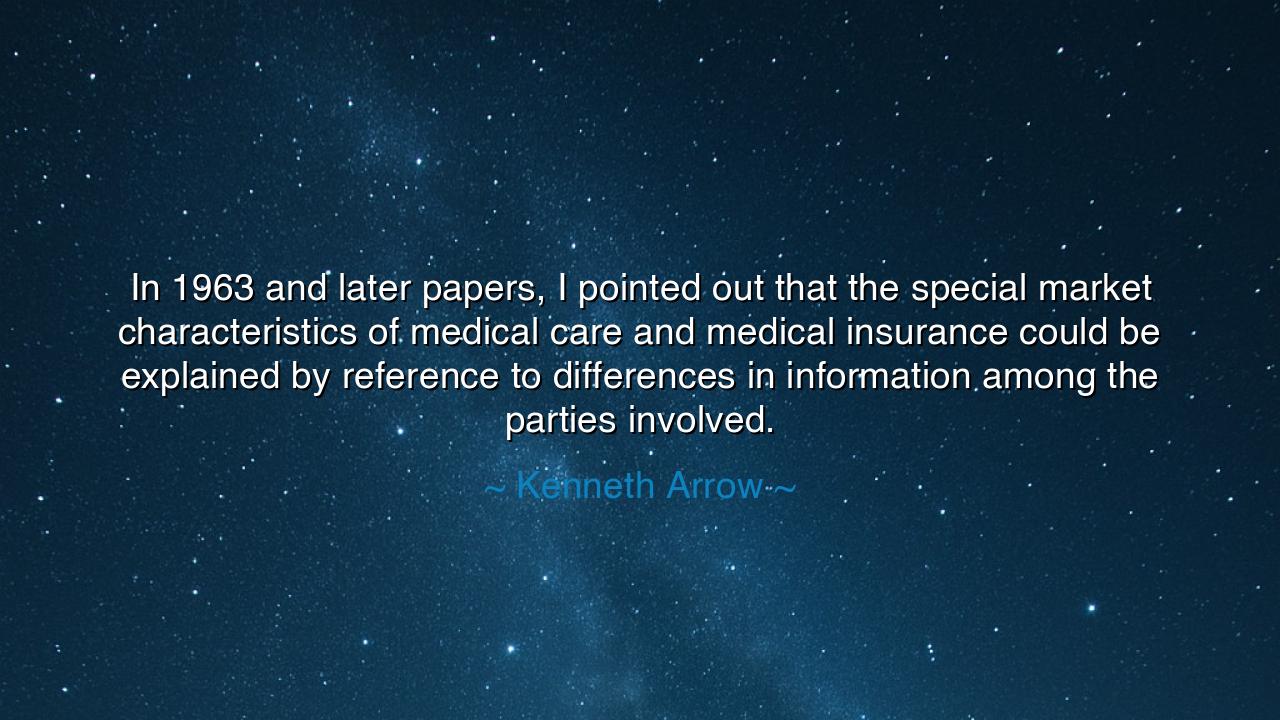
In 1963 and later papers, I pointed out that the special market
In 1963 and later papers, I pointed out that the special market characteristics of medical care and medical insurance could be explained by reference to differences in information among the parties involved.






"In 1963 and later papers, I pointed out that the special market characteristics of medical care and medical insurance could be explained by reference to differences in information among the parties involved." — Kenneth Arrow
Listen, O seekers of wisdom, to the words of Kenneth Arrow, the sage of modern economics, whose insight pierced the veil of markets and revealed their hidden frailties. When he spoke of medical care, insurance, and the differences in information among the parties involved, he was not merely discussing numbers and contracts — he was describing a moral truth about the human condition. In every exchange of life — be it in trade, in healing, or in governance — there exists imbalance of knowledge, and from that imbalance flows the danger of injustice. His revelation in 1963 did not simply shape economics; it became a torch illuminating the shadowy realms of trust, power, and uncertainty that dwell wherever humans depend upon one another.
For in the marketplace of ordinary goods, both buyer and seller stand in near equality — each knows the worth of what he gives and receives. But in the market of health, the veil thickens. The doctor, bearer of knowledge, stands as guardian of life itself, while the patient, vulnerable and often afraid, must place faith where understanding cannot reach. The insurer, too, peers through cloudy glass — unable to foresee who will fall ill, yet tasked to bear the cost when they do. Thus arises what Arrow called asymmetric information — a gulf between those who know and those who must trust. And from this gulf spring the distortions that make the healing of the body also a test of the soul.
In ancient times, such truths were not spoken in the language of markets, but of virtue and honor. The physician of Hippocrates was bound by an oath not merely to cure, but to act with integrity — for even then, men understood that when knowledge is unequal, morality must bridge the gap. The healer was charged with the sacred duty to use his wisdom not for gain, but for service. Yet in the modern age, where the act of healing has become entangled with the machinery of money, Arrow’s words remind us that economics without ethics becomes blind, and science without compassion becomes hollow.
There is a story from the war-torn fields of the twentieth century, when doctors treated soldiers whose lives hung by a thread. The wounded did not ask the price of care, nor did the medics seek to calculate risk. In that moment, the asymmetry of information vanished, replaced by the symmetry of human duty. Arrow’s insight, then, was not meant to condemn the imperfection of the system, but to reveal the need for trust — that invisible currency which no market can manufacture, yet upon which every act of care depends. Where trust fails, even the most advanced systems collapse; where it flourishes, even the poorest clinic can become a sanctuary.
Arrow’s discovery was born of intellect, but its spirit was moral. He saw that the market of medicine could never be truly free, because health is not a commodity — it is a covenant. The doctor does not sell a product; he offers hope. The patient does not buy a service; he seeks mercy. Thus, the exchange is sacred and cannot be governed by price alone. It requires faith, fairness, and regulation — not to hinder the market, but to ensure that the strong do not exploit the weak. Arrow’s work became the foundation for understanding why governments, communities, and institutions must intervene — to balance what knowledge alone cannot equalize.
And so, O children of reason and conscience, learn from this wisdom: knowledge is power, and power demands responsibility. In every sphere of life, whether in medicine, education, or governance, the one who knows more bears the duty to act with greater compassion. Do not use wisdom as a weapon, but as a light for those who walk in darkness. The teacher must protect the student, the leader the citizen, the doctor the patient. This is the ancient moral law reborn in modern form — the law that Kenneth Arrow clothed in the language of economics, yet rooted in the heart of humanity.
Let this be the lesson carried forward: markets may run on exchange, but societies run on trust. Guard that trust, and the world prospers; betray it, and no wealth can restore the loss. Be honest in your dealings, humble in your knowledge, and faithful to those who depend upon your skill. For every difference in information is a test of character, and every imbalance of power is a call to mercy. As Arrow’s insight endures through time, so too must we remember: wisdom alone does not make us great — integrity does.






AAdministratorAdministrator
Welcome, honored guests. Please leave a comment, we will respond soon